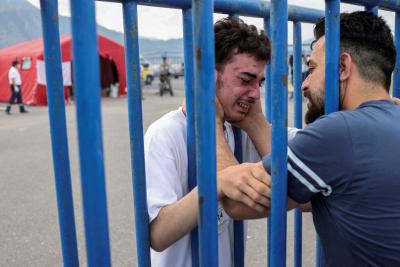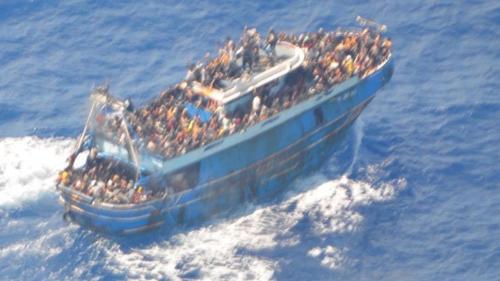Serious Concerns Raised over Adriana Shipwreck Incident in Greece

PYLOS – Serious concerns have been raised by the survivors of the sunken fishing Adriana vessel in Greece.
On July 14, the fishing vessel Adriana sank with an estimated 750 people on board, following to the 104 survivors’ statements, serious concerns arose about the involvement of a Greek coast guard boat in the incident.
Amnesty International and Human Rights Watch have called for an urgent investigation on the matter, stressing for it to be independent, and impartial in order to uncover the truth and deliver justice to survivors and families of the victims.
The survivors' testimonies uncovered a disturbing discrepancy between the version reported by them and the one presented by Greek authorities. According to the survivors, the Hellenic Coast Guard vessel dispatched to the scene attached a rope to the Adriana and started towing it, causing the vessel to sway and ultimately capsize. Survivors further asserted that they pleaded for rescue and even used a satellite phone to call for help in the hours leading up to the tragic event.
In response to the survivors' claims, Greek authorities have denied any wrongdoing and stated that the individuals on the boat only requested for food and water to be delivered to them. The officials claimed that the coast guard vessel approached the Adriana and attempted to assess whether the passengers wanted help, but negotiations failed when the passengers threw the rope back, indicating their desire to continue the journey.
Amnesty International and Human Rights Watch undertook a fact-finding mission to Greece between July 4, and July 13, where they interviewed 19 survivors, 4 relatives of the missing, and the representatives from non-governmental organizations, UN and international agencies, the Hellenic Coast Guard, and the Greek Police. These interviews substantiated the concerns raised by reputable sources, adding weight to the survivors' accounts.
To ensure the credibility of the ongoing investigations, Amnesty International and Human Rights Watch have called for the need for the Supreme Court Prosecutor's Office to supervise the judicial investigations. Additionally, Greek authorities are expected to promptly provide the Greek Ombudsman's office with the necessary resources, information, and evidence to carry out its functions as the National Mechanism for Investigating Incidents of Arbitrariness related to any disciplinary investigation.
Survivors reported that their phones were confiscated by authorities without motive and that they have not been instructed on how to retrieve them. This action has left many survivors deeply distressed, as they feel their evidence and memories of lost loved ones have been taken from them and they are not able to easily get in touch with others.
The incident at Pylos highlights a broader concern regarding the Greek authorities' accountability for violent and unlawful pushbacks at the country's borders. Greece has already been accused of similar wrongdoing following the ‘Farmakonisi’ shipwreck and has been condemned for mishandling rescue operations and inadequate investigation of the incident by the European Court of Human Rights.
The Pylos tragedy’s gravity of international significance, Amnesty International and Human Rights Watch call on Greek authorities to allow and welcome any international and/or European assistance and cooperation during the investigative process to ensure independence, effectiveness, and transparency.
A comprehensive and credible investigation is needed in order to ensure that responsibility for the ship's sinking is taken and identify any delays or shortcomings in the rescue efforts that contributed to the devastating loss of life. Testimonies from all survivors should be obtained under conditions that ensure their trust and safety. Furthermore, all forensic evidence, including digital data, should be thoroughly collected, assessed, and safeguarded to facilitate accountability processes.
All entities involved or with knowledge of the incident, including the Hellenic Coast Guard, Frontex, the captains, the crews, and any other participants in the operation, should be invited to testify and cooperate with the investigations.
Parallel to the national inquiry, the EU Ombudsman has announced an inquiry into Frontex's role in search and rescue activities in the Mediterranean, including the Adriana shipwreck disaster. This investigation will probe Frontex's practices, protocols, and actions in relation to its fundamental rights obligations and EU laws during this and other shipwrecks.
Amnesty International and Human Rights Watch continue to investigate the Pylos event and demand justice for all the people affected.
nk

© COPYRIGHT ITALIAN INSIDER
UNAUTHORISED REPRODUCTION FORBIDDEN


